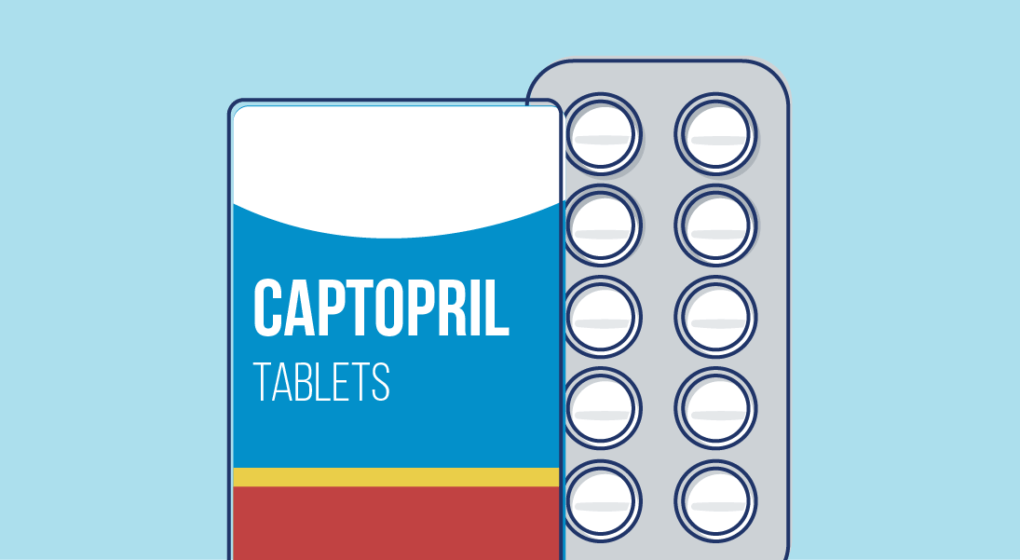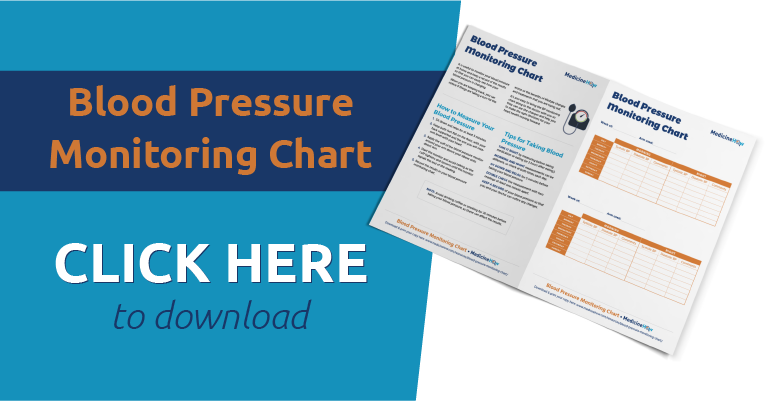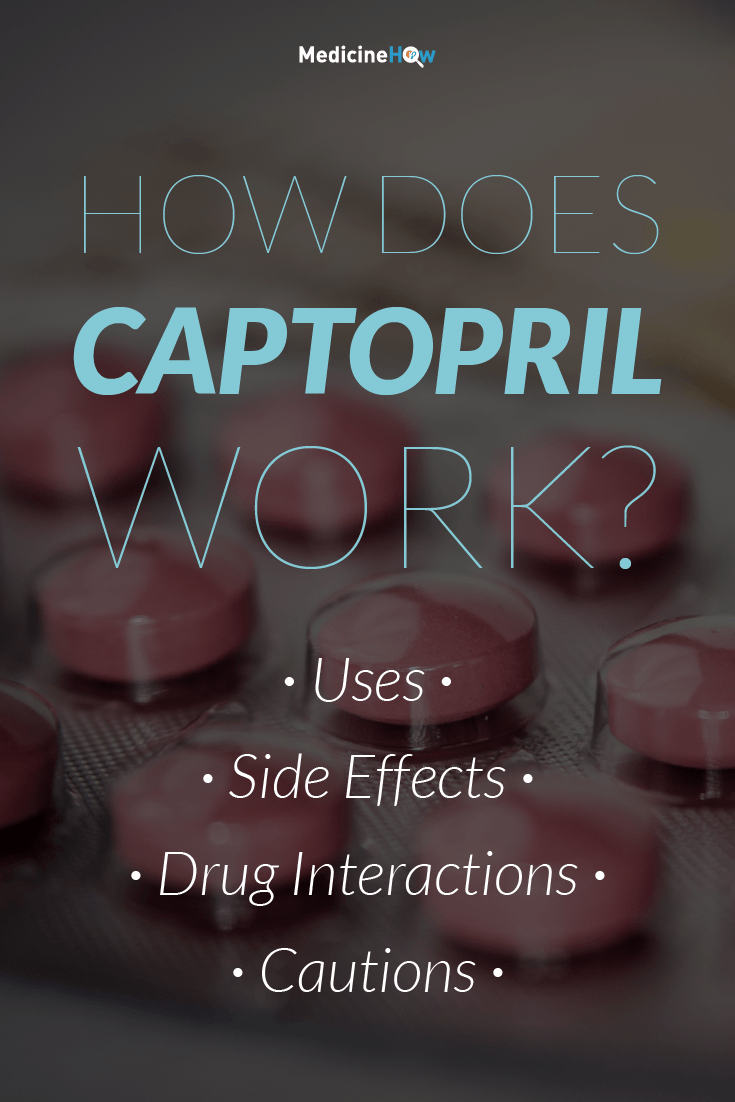
Captopril is a type of drug called an ACE inhibitor, which works to lower the blood pressure by stopping a hormone called angiotensin II from being formed. This hormone usually increases the blood pressure, so when captopril prevents it from being produced, the blood pressure will get lower.
If you or someone you know needs to take captopril to help in the treatment of hypertension or to improve your heart health, most of the details you need can be found here.
Brand Names and Doses
![]() Captopril is the name of the actual drug in the medication you are taking, known as the generic name. There are a couple of different brand names for the medication that you might be more familiar with, which are:
Captopril is the name of the actual drug in the medication you are taking, known as the generic name. There are a couple of different brand names for the medication that you might be more familiar with, which are:
- Capoten
- Zedace
Both of these brand medications contain the same drug and work in the same way in your body. They are simply called different because different manufacturing companies produce them.
There are three different doses available in a tablet form: 12.5 mg, 25 mg and 50 mg. Additionally, there is an oral liquid available of the Capoten brand in a dose of 5 mg/mL, which may be useful if you are not able to swallow a tablet.
If you are taking captopril for the first time, your doctor might recommend for you to begin with a lower dose. For example, you might start with a dose of 12.5 mg and gradually increase it over a few weeks or months until you reach your target blood pressure. This is to decrease the risk of any side effect you might experience as your body gets accustomed to taking the medication.

What type of drug is it?
![]() Captopril is a type of drug called an angiotensin-converting enzyme (ACE) inhibitor. This is a group of medications that work in a similar way together, called a drug class. Other medicines in the same class are:
Captopril is a type of drug called an angiotensin-converting enzyme (ACE) inhibitor. This is a group of medications that work in a similar way together, called a drug class. Other medicines in the same class are:
Although each of these medications work in the same way, there are subtle differences between them. Some of them last longer in the body than others, meaning the dose might be once a daily, instead of twice daily. Some might be a better choice if you have other particular health conditions, such as kidneys or liver that don’t function as well as usual.
How does it work?
![]() Captopril can be used to lower blood pressure and to help strengthen the heart because of the way it works on the body.
Captopril can be used to lower blood pressure and to help strengthen the heart because of the way it works on the body.
Like other ACE inhibitor drugs, it stops an enzyme in the body from converting angiotensin I to angiotensin II. Angiotensin II is the active form, which usually help to keep the blood pressure high by tightening the blood vessels and increasing the amount of blood travelling through them.
When you take an ACE inhibitor like captopril, you don’t have as much angiotensin II in your body and it can’t work its effect to increase as usual. This is what happens:
- The muscles around your blood vessels relax, creating more room for the blood to pass through.
- Your kidneys reabsorb less water and you excrete more in your urine, which means you will have less blood in your blood system.
The result? Less blood pumping around larger blood vessels means lower blood pressure and an easier job for your heart!
Side Effects
![]() ACE inhibitors have a broad action on the body and, as a result, there are several side effects that can occur when you take captopril. Although for the complete list you should see the medicine information leaflet of your medication, the most important side effects are explained below.
ACE inhibitors have a broad action on the body and, as a result, there are several side effects that can occur when you take captopril. Although for the complete list you should see the medicine information leaflet of your medication, the most important side effects are explained below.
Low blood pressure
The most common side effects of taking captopril occur when the drug is working too well – when you end up with blood pressure that is too low. This is called hypotension and signs that you might notice are:
- Headache
- Tiredness
- Dizziness
- Flushing
This is most common when you first start taking captopril, as your body gets used to taking the medication and the effects of the drug on your body. Over a few days, your body should start to adjust and these side effects should go away.
If you think that your blood pressure might be too low – you can test you blood pressure to make sure – you may need to talk to your doctor about adjusting the dose of captopril. Usually, the dose is simply a little too high and a small reduction is enough to improve these side effects.
Excess potassium (hyperkalaemia)
Captopril causes more water to be excreted in the urine, which can disrupt the normal balance of salts in your body. In particular, less potassium is excreted in your urine and it can build-up in the blood, causing symptoms like tiredness and muscle weakness.
The best way to check if you have high potassium levels is to take a simple blood test, so talk to your doctor if you think you are experiencing these signs.
Cough
Many people tend to get a dry cough when they take the medication, which can be quite frustrating as it does not seem to go away. If you experience a cough and it annoys you, you should talk to your doctor about alternative medications, such as an angiotensin II channel blocker.
Cautions
![]() Angioedema
Angioedema
Rarely, captopril can lead to swelling on the mouth and throat called angioedema. This is a serious effect, as it can stop you from breathing as normal.
If you have previously suffered from angioedema, captopril is not recommended. If you are taking the medication and you notice signs, you should seek medical advice immediately.
Renal Impairment
Captopril puts extra pressure on the kidneys and increases the risk of renal impairment, particularly when used with other medications such as NSAIDS and diuretics. If you have poor renal function, captopril is not likely to be the best choice of drug for you.
Stopping Suddenly
Captopril is a long-term solution to manage high blood pressure and is supposed to be taken regularly to have a continuous effect. If you suddenly stop taking it, the amount of angiotensin II in your body will increase rapidly once again, causing more blood to push through smaller blood vessels. Your hypertension might be even worse than in the beginning because of the sudden change.
If you want to stop taking captopril, you should gradually reduce your dose over a few weeks, just as you increased the dose when you first started. For example, if you are taking 25 mg daily at the moment, you can reduce the dose to 12 mg daily until your body adjusts before you stop completely.

Interactions
![]() Captopril can interact with several different drugs in your body. Depending on the combination, sometimes we can simply change the doses when taking two drugs together but sometimes the combination shouldn’t be used at all.
Captopril can interact with several different drugs in your body. Depending on the combination, sometimes we can simply change the doses when taking two drugs together but sometimes the combination shouldn’t be used at all.
Lithium + Captopril Interaction
Captopril can decrease the amount of lithium that is excreted from the body, leading to high concentrations and increased risk of side effects. The dose of lithium can be reduced to manage this, or an alternative blood pressure medication can be used.
Loop Diuretic + Captopril Interaction
Taking a loop diuretic drug and captopril together increases your risk of side effects related to blood pressure that is too low, particularly for the first few doses of captopril. You can take them together, but you may need a lower dose or to stop taking the loop diuretic for a few days in the beginning. Using both together may also increase risk of renal impairment.
NSAID + Captopril Interaction
NSAIDs and captopril can sometimes be used together in young otherwise healthy patients, but captopril might not work as well to reduce your blood pressure. the risk of renal impairment and hyperkalaemia is increased with both together.
Thiazide Diuretic + Captopril Interaction
Taking a thiazide diuretic and captopril together increases your risk of side effects related to blood pressure that is too low, particularly for the first few doses of captopril and may increase the risk of renal impairment. Sometimes using a lower is okay but the combination is not recommended in some cases.
Pregnancy and Breastfeeding
![]() You should not take captopril if you are pregnant, breastfeeding or planning to become pregnant in the future. Doses in the first trimester may cause major congenital malformations (birth defects) and later in the pregnancy may cause renal dysfunction of your baby.
You should not take captopril if you are pregnant, breastfeeding or planning to become pregnant in the future. Doses in the first trimester may cause major congenital malformations (birth defects) and later in the pregnancy may cause renal dysfunction of your baby.
If you are breastfeeding, captopril may be taken. Very small amounts may be excreted in the breast milk, but no side effects have been reported. It is best to monitor for possible signs of low blood pressure in your baby, however, such as tiredness and irritability.


